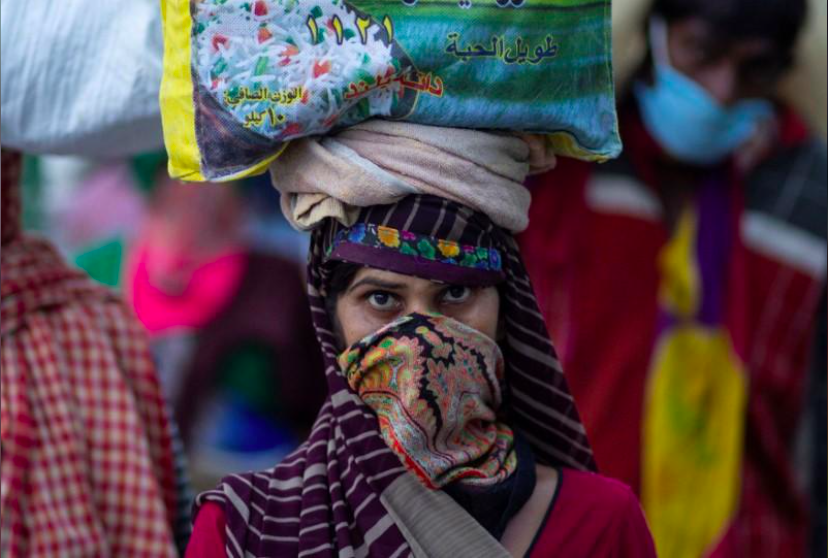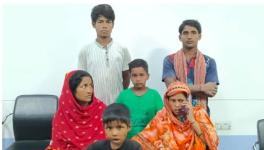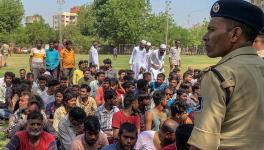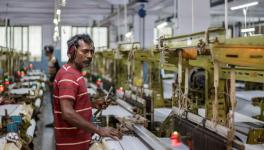Differently-abled Migrant Women Workers Grapple with the Pandemic

The complexities of vulnerabilities of marginalised sections have been propelled further by the socio-economic impact of COVID-19. The author looks at the political economy of differently-abled migrant women workers to understand the deprivation and explore government intervention in the same.
———-
When Anita Ghai, a prominent disability rights advocate, said that the heterogeneity of disability is often ignored in terms of governance and policymaking, she had a point.
Despite existing policies, there are loopholes in their implementation. The political economy of disability needs to be understood. The attitude of the governments seems to be that if they invest in infrastructure for persons with disability, they would be losing money.
Women and the differently-abled form one of the most vulnerable sections in society. To understand the struggle of differently-abled migrant women in India we should closely look at the political economy and their social deprivation.
“The political economy of disability needs to be understood.”
The recent migrant exodus has caused a wave of reverse migration in the country where the migrant workers are returning to their native states. This is a direct result of the national lockdown imposed in India, due to the COVID-19 pandemic that has resulted in an economic recession.
It has forced businesses to shut down and has driven migrant workers out of jobs and means of livelihood. This has prompted migrants to travel long distances and cross state borders on foot due to transportation restrictions and economic depravity.
Unfortunately, government mechanisms to protect labor rights have been disregarded and ignored. The Inter-State Migrant Workmen Act stipulates an additional displacement allowance of 50% of monthly wages at the time of recruitment and journey wages for the migrant to return back to their residence in the other state. This act has been one of the most unregulated labor rights in recent times. Other social welfare schemes are unable to reach the migrant workers as their current residence is different from their residence registered in their PAN cards and Adhaar cards.
Women bear the larger brunt of the inter-state migrant crisis. They are underpaid and their gender-specific needs are unaccounted for.
“The most vulnerable of migrant women labor are those employed in unskilled to semi-skilled jobs. “
The most vulnerable of migrant women labor are those employed in unskilled to semi-skilled jobs. They usually belong from rural areas and migrate with their families to work in factories and construction sites in urban areas.
A study found that 78% of rural and 59% of urban women migrant workers were working as unskilled manual labor; 16% and 18% were in skilled manual work in rural and urban areas respectively. They have reported poverty, debt, lack of local employment, and migration of their husbands the main reasons for inter-state migration.
Reports suggest that the rate of suicide among female migrant workers is on the rise and the irregularity of their immigration status is directly proportionate to the amount of abuse they suffer. Apart from working in factories and in households as domestic help female migrant workers also have the responsibility to take care of their household, which is not economically accountable.
A large number of interstate migrating families presently do not have access to food and medication. In these excruciating circumstances, menstrual health and hygiene have been ignored- specifically because sanitary products were not even counted as essential goods (till March 30).
Pregnant migrant women were forced to give birth on highways and were relying solely on cloth and ash to deal with their menstrual cycles. Without medical aid and essential healthcare mechanisms, giving birth to a child while the mother is malnourished and dehydrated is a risk many women take. Existing legal mechanisms like the Maternity Benefit Amendment Act fail to serve their purpose in such situations.
“The Human Rights Watch refers to them as ‘Invisible Victims of Sexual Violence’”
Differently-abled migrant women face the larger disproportionate brunt of lockdown. Apart from the migration crisis, women also become victims of domestic violence. The Human Rights Watch refers to them as ‘Invisible Victims of Sexual Violence’. Domestic violence can range from physical violence, the threat of abandonment, verbal abuse, and so on. Domestic violence cases usually go unreported due to stigmatization and social isolation the woman needs to go through and lack of economic standing. Even though several sexual harassment reforms have been amended on paper, their lack of enforcement has prevented women from easy access to justice.
According to the Disability Guidelines issued by the Health Ministry, which states: “Special care should be taken with respect to women and children with disabilities”. Even so, there have been several reports of violence and domestic abuse towards differently-abled women and children, labeling them as a burden on the household and society.
Images of differently-abled and elderly being carried around on the back of their coworkers and family have flooded the internet. It is important to note that visually and mentally impaired migrants need constant support to navigate their daily life.
In the current pandemic and the social-distancing norm, they fear for their jobs and life. A report by PARI (give full form and say who they are) discussed two visually impaired migrants who begged on streets and worked in the railway station, wondering who would help them down trains and buses or buy from their street-side shops. The lack of inclusivity infrastructure in the country prevents them from having easy access to information and transportation.
“Their complex intersectional identity and society’s ignorance towards their needs have hindered them from equality and forbid them to be empowered and independent”
One migrant worker noted that to even read Braille signage they need to constantly touch things which put them at high risk for contracting the virus. Unlike most of us, differently-abled migrant women cannot work virtually and earn for them or their families. As there is a dearth of information focusing on differently-abled women migrants and their grievances are not covered by mainstream media, it is hard to expect any rapid change in government policy or amendments to the existing acts. Their complex intersectional identity and society’s ignorance towards their needs have hindered them from equality and forbid them to be empowered and independent.
The government needs to create an effective door to door delivery mechanisms of essential items for differently-abled people. Now that lockdown restrictions have been removed in most states, the government needs to make sure that people get back on their feet and are provided with essentials.
The government is generating cards for differently-abled people which will make them derive benefit from a number of schemes. The lockdown has generated a rise in local entrepreneurship, and it is anticipated that it will increase local employment. This may benefit differently-abled rural women as they can keep earning and be with their families, without the need to migrate.
(Author is an undergraduate at Jindal Global Law School. Views expressed are personal.)
Get the latest reports & analysis with people's perspective on Protests, movements & deep analytical videos, discussions of the current affairs in your Telegram app. Subscribe to NewsClick's Telegram channel & get Real-Time updates on stories, as they get published on our website.
























